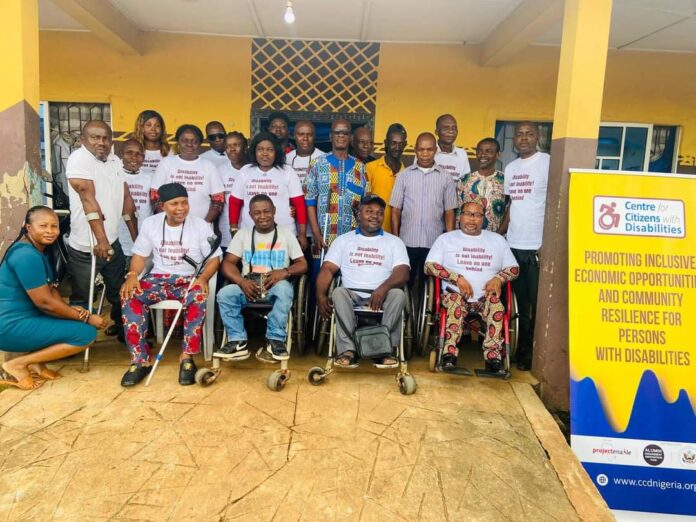In a significant move towards promoting inclusivity and resilience for persons with disabilities (PWDs) in Abia State, the Centre for Citizens with Disabilities (CCD), in partnership with Project Enable Africa and supported by the US Consulate, organized a transformative two-day workshop. Held on the 25th and 26th of June, 2024, this workshop titled “Strengthening the Community Resilience of the Leadership of the Community of PWDs through Advocacy in Abia State,” was a beacon of hope and empowerment for many.
The event kicked off with inspiring opening remarks from Mr. Godwin Unumeri, the Acting Director of CCD. Mr. Unumeri’s address set a powerful tone for the workshop, emphasizing the critical need for advocacy and resilience within the PWD community. His words were followed by a heartfelt goodwill message from Madam Ann Ojugo, the chairperson of the Joint National Association of Persons with Disabilities (JONAPWD), who reiterated the importance of unity and collective action in the fight for disability rights.
The first presentation of the day, “Understanding Disability Rights and Advocacy,” was delivered by Florence Attah, a respected advocate in the field. Attah’s presentation was both enlightening and empowering, encouraging PWDs to take a stand for their rights and build their capacities. She skillfully highlighted the multifaceted barriers that PWDs face—attitudinal, institutional, communication, and environmental—while also providing practical strategies to overcome these challenges. Her call to action resonated deeply with the audience, many of whom left the session feeling inspired and ready to advocate for change.
Following Attah’s presentation, Mr. Godwin Unumeri returned to the stage to lead the second presentation, “Introduction to Advocacy and Advocacy Action Plan.” With clarity and expertise, Mr. Unumeri provided an in-depth overview of the components of an effective advocacy action plan. He guided participants through the process of creating actionable strategies, emphasizing the importance of setting clear goals, identifying key stakeholders, and developing a structured approach to advocacy. His presentation equipped attendees with the tools needed to drive meaningful change in their communities.
The second day of the workshop built on the momentum of the first, reaching its peak as participants shared their insights and reflections. This collaborative exchange of ideas underscored the workshop’s emphasis on community resilience and collective empowerment. The discussions were vibrant, with participants expressing renewed determination to tackle the barriers they face and to work together towards a more inclusive society.
The day’s sessions included a compelling presentation on “Partnership and Collaboration with PWDs Inclusion,” which highlighted the immense benefits of fostering partnerships and collaboration. The presenter emphasized that inclusive workplaces not only benefit individuals with disabilities but also enhance the overall work environment by fostering diversity and ensuring equal opportunities for all employees. This presentation was a powerful reminder of the positive ripple effects of inclusion, encouraging attendees to seek out and build partnerships that promote disability inclusion.
The final presentation, “Disability-Inclusion Budgeting,” delved into the critical role of budgeting in ensuring sustainable and inclusive economic opportunities for PWDs. The speaker emphasized that effective budgeting is crucial for creating an environment where PWDs can thrive. By allocating resources towards inclusive programs and initiatives, communities can ensure that PWDs have access to the same opportunities as their non-disabled counterparts. This session provided practical insights into how organizations and governments can incorporate disability inclusion into their budgeting processes, paving the way for long-term change.
Throughout the workshop, the atmosphere was one of empowerment and hope. Participants left with a renewed sense of purpose and a clear understanding of the steps needed to advocate for their rights and build resilient communities. The collaborative efforts of CCD, Project Enable Africa, and the US Consulate were instrumental in making this event a success, providing a platform for PWDs to voice their concerns, share their experiences, and develop strategies for positive change.
The workshop concluded with a strong call to action, urging all participants to continue their advocacy efforts and to support one another in the fight for disability rights. The event was not just a workshop; it was a movement towards a more inclusive and equitable society, where every individual, regardless of their abilities, has the opportunity to thrive. The success of this workshop marks a significant step forward for the PWD community in Abia State, setting the stage for continued advocacy and progress in the years to come.


